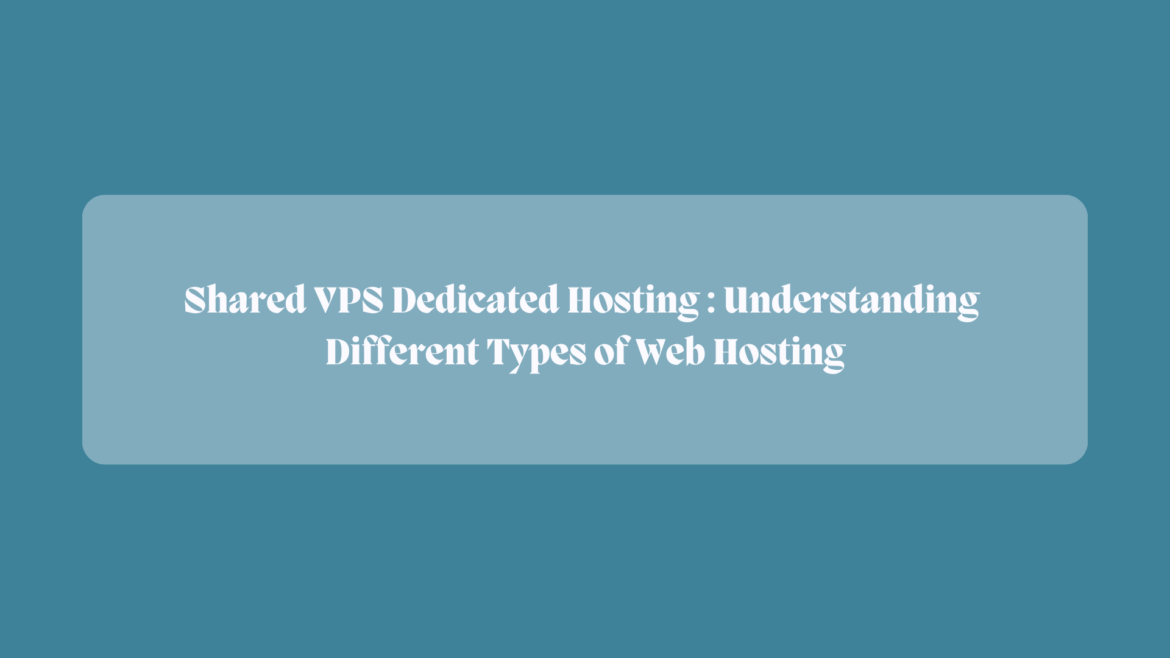Shared, VPS, and Dedicated Hosting : Understanding Different Types of Web Hosting
Introduction
Selecting the appropriate web hosting type is essential for the triumph of your website, influencing various aspects such as performance, security, and scalability. From shared and VPS hosting to dedicated and cloud-based solutions, there are various options available, each with distinct benefits suited to different requirements and financial constraints. However, how can you ascertain which web hosting type is most suitable for your business or personal endeavor? This detailed guide delves into the most pertinent types of web hosting, enabling you to make a well-informed choice that corresponds with your website’s needs and future expansion plans.
Web Hosting Overview
Web hosting is an essential service that enables individuals and businesses to have their websites accessible online. It consists of storing website data on a server, a robust computer that operates non-stop to ensure websites are accessible 24/7 to users worldwide. The types of web hosting services offered can range from shared hosting, where multiple websites share a server, to dedicated servers where a single website has exclusive access to all server resources.
Importance and Significance of Web Hosting
Establishing an Online Presence: The selection of web hosting plays a vital role in determining the accessibility and dependability of a website. This is essential as the quality of hosting directly influences user satisfaction, website speed, downtime, and the capacity to manage spikes in traffic. All these aspects are crucial for the prosperity of any online enterprise.
Influence on Functionality and SEO: Effective web hosting guarantees that your site remains reachable at all times, delivering a dependable and seamless experience to visitors. This is not only important for ensuring customer satisfaction but also for SEO purposes. Search engines prioritize websites that load quickly and maintain consistent availability.
Security Deliberations: In addition to performance, the security of a website is also impacted by web hosting. Trustworthy web hosts provide robust security measures to shield your site’s data from cyber threats such as hacking and malware. They also conduct regular backups to ensure data integrity, crucial for recovery in the event of data loss.
Scalability Choices: As businesses expand, their website traffic may grow, necessitating more resources than initially required. Reliable hosting providers offer scalability options, enabling website owners to upgrade their hosting plans to accommodate increased traffic and data as their business grows. This highlights the importance of web hosting in business growth and expansion strategies.
Different Web Hosting Options
Shared Hosting Explained
Shared hosting is when several websites share a single server and its resources, like RAM, CPU, and disk space. This type of hosting is popular among beginners and small websites because it’s simple and cost-effective. The hosting provider takes care of the server, including software installation, security updates, and technical maintenance, making it user-friendly for those without technical knowledge.
Shared Hosting Benefits:
Cost-effectiveness: Shared hosting is typically the most budget-friendly hosting solution, making it a compelling option for individuals, small businesses, or those launching a new website.
User-Friendly: Providers frequently offer integrated management tools like cPanel, enabling users to effortlessly oversee their websites, create email accounts, install applications, and manage other website-related tasks without requiring extensive technical expertise.
Pre-set Server: The hosting company pre-configures the server, relieving users of the need to concern themselves with technical setup and allowing them to concentrate on their website’s content and design.
Shared Hosting Limits:
Resource limitations: In shared servers, such as bandwidth and processing power, can result in slower performance for your website during high traffic periods on the server.
Security Risks: Shared hosting comes with higher security risks, as a compromise on one website can potentially affect all other websites on the same server, despite security measures being in place.
Limited customization and scalability: Shared servers offer limited customization and scalability, which may no longer meet your needs as your site grows in terms of performance and the ability to implement specific software or applications.
Good to Read: Best Shared Hosting options at Host24
VPS Hosting
* VPS Hosting, also known as Virtual Private Server Hosting, is a type of hosting that utilizes a technology to split a single physical server into multiple virtual servers.
* Each virtual server operates independently, providing users with their own dedicated resources such as CPU, RAM, and disk space.
* This type of hosting offers a balance between affordability and performance, bridging the gap between shared hosting and dedicated hosting.
* Users can enjoy a private environment similar to a dedicated server without the high cost, as they only pay for the portion of the server they are utilizing.
VPS Hosting Advantages:
Enhanced Authority: Users have full control over their virtual space, allowing for advanced server customization. This means that software applications can be installed and configured according to specific business requirements without any limitations imposed by a shared hosting environment.
Heightened Security: Each VPS is isolated from other virtual servers on the same physical server, which enhances security. This isolation reduces the risks associated with malware or other security threats originating from other users.
Tailored Resources: VPS hosting allows for the scaling of resources such as RAM, CPU, and disk space as needed, without having to wait for physical server modifications. This scalability ensures that businesses can adjust their hosting environment based on their current needs and budget.
Exclusive Resources: In contrast to shared hosting, where resources are shared among all users on a server, VPS provides dedicated resources. This guarantees that the server’s performance remains stable and predictable, even during peak traffic periods.
VPS Hosting Optimal Use Cases:
Small and medium-sized enterprises (SMEs) that encounter occasional surges in website traffic can greatly benefit from VPS hosting. It provides the flexibility to manage traffic spikes without the expensive nature of a dedicated server.
Online stores that necessitate quick, dependable, and secure transactions find VPS hosting advantageous. The capability to adjust resources is essential for handling sales events or promotions that may attract higher traffic.
Websites that operate custom applications, such as CRM software or intricate databases, require the flexibility and dedicated resources that VPS offers. This guarantees smooth operation without the constraints of shared hosting.
Developers in need of a stable and isolated environment for application development and testing can make use of VPS hosting. It presents a cost-efficient method to replicate various environments without the necessity of multiple physical servers.
Please check: Cloud VPS Hosting
Dedicated Hosting
* Dedicated hosting involves providing an entire server exclusively for one client’s use, ensuring sole access to its resources.
* This type of hosting eliminates the necessity to share server resources such as CPU, RAM, or storage with other websites.
* It allows complete control over the server environment, enabling customization of software and security settings.
Dedicated Hosting Important Benefits:
Control: Users are granted root access to the server, allowing them to install and manage any software without limitations.
Performance: By dedicating all server resources to one client, there are significant performance advantages, particularly for resource-intensive websites.
Security: Enhanced security is achieved through the ability to implement tailored security measures to meet specific requirements, without the need to consider other users on the server.
Dedicated Hosting Real-world Examples
For large corporations: Designed for big companies in need of strong hosting solutions to handle heavy website traffic and secure data.
Websites with high traffic: Tailored for sites experiencing high volumes of visitors and needing to sustain top performance during busy periods.
Applications with high resource demands: Well-suited for apps that consistently require significant server resources, like large databases or intricate web applications.
Please Read: Powerful Dedicated Server Options to select
Conclusion
This article provides an overview of various web hosting options, including Shared, VPS, and Dedicated hosting, each designed to cater to specific needs, ranging from individual bloggers to large corporations. Familiarizing yourself with these choices will assist you in choosing the most suitable hosting solution for your website’s specific needs and future expansion goals.




